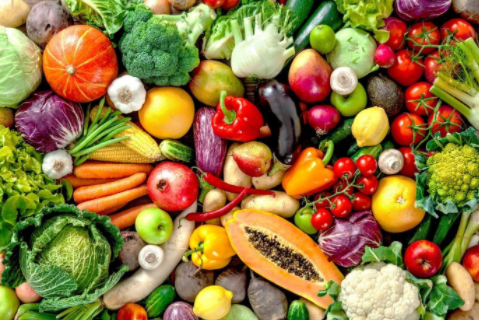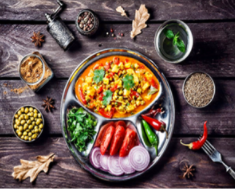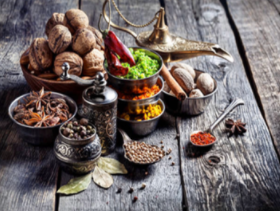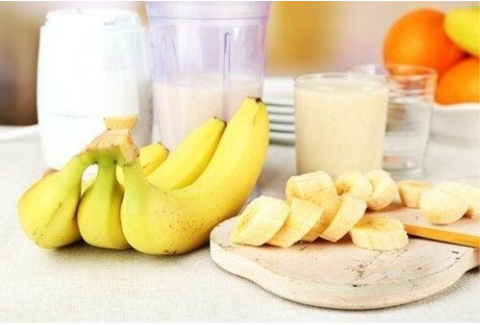A healthy digestive system is important for our overall health: physically, mentally and emotionally. Yet many today struggle with indigestion, gas, bloating and other gastrointestinal disorders and diseases.
According to Ayurveda, the root cause of these complications stems from a weak digestive system. Science's approach to aahar (diet) can be especially helpful as it focuses on maintaining a healthy agni (digestive fire) that strengthens the immune system and eliminates waste from the body. This is done by consuming an ideal diet based on the constitution of the individual, which includes the three doshas (vata, pitta and kafa).
Ayurveda is built around the five elements ether, air, fire, water and earth. The unique combination of these elements comes together to build the three main doshas – the constitutions of:
- Wadding (air),
- Pita (fire),
- Coffee (earth).
Good health is considered a perfect balance of three doshas.
What is food combination?
According to Ayurveda experts, healthy agni determines how well you digest food. No less important, however, is the way we combine foods.
In Ayurveda, each food is characterized on the basis of its taste (rasa), heating or cooling energy (virya) and post-digestive effect (vipaka).
When two or three foods with different attributes are combined together in one meal, it puts stress on our digestive tract and can cause:
- bloating,
- fermentation,
- gases,
- emotional imbalance,
- formation and accumulation of ama (toxins). These incompatible combinations are known as virudh aahar.
At the same time some foods with similar attributes are digested faster and ultimately strengthen the digestive system. Therefore, knowledge of compatible and incompatible food combinations is essential.
Diet and dosha
Food or ahara is one of the three basic principles in Ayurveda. The texts on Ayurveda from 300 BC – 700 AD have devoted entire sections to diet and its impact on health and well-being.
Charaka Samhita,considered the main text on the topic, shares descriptions of the classification of foods based on their taste, therapeutic properties and more. As well as food safety and various incompatibilities based on tastes, processing, dose, time, place, etc.
According to Ayurveda doshas determine which foods you should eat to maintain inner balance:
- Vata dosha recommends warm, moist and grounding foods,
- Pitta dosha focuses on cooling, energizing foods and limited spices,
- Kapha dosha is undoubtedly in favor of fruits, vegetables and legumes.
Ayurvedic nutritionists advise you to clarify a few questions related to your personal constitution before embarking on a diet:
- Understand the level of tolerance to spices according to your dosha
- Determine the most suitable food consistency for you
- Which are the vegetables that create the imbalance
- Reaction to the consumption of citrus fruits
- Quantitative ratio of proteins
- Reaction to caffeine
The dosha of the body changes according to the season, therefore seasonal nutrition is key to maintaining balance. The same food ingredient can affect you differently during different seasons of the year. Therefore, the recommendation is to consume mainly foods according to the season. This practice will provide you with the right balance of nutrition according to your dosha.
It may be fashionable to eat "seasonally", but for Ayurveda it is not fashionable, I believe. In the summer we need cooling foods, as the heat aggravates the pitta dosha. Then foods such as rice, milk, ghee, sugar, grapes, coconut water are recommended.
During the cold seasons,due to the drop in temperature, sweet, sour, salty foods and drinks are preferred Food should be dry, hot, greasy and easily digestible. Canned rice, wheat, barley, hot soups are recommended. In winter, when the air is dry and cold, a diet is recommended to increase the pie, which is hot, sweet, sour, salty food.
Here are some more useful tips according to Ayurveda:
- The food must be tasty, warm, of good quality and easy to digest.
- Eat neither too fast nor too slow.
- Eat only when you are hungry after the last meal has been digested.
- The daily diet should include all tastes – sweet, sour, salty, bitter, spicy.
- Eat food appropriate to your particular constitution, mental and emotional temperament.
- Focus on the food as you eat.
- Eat in a comfortable sitting position.
- Eat in a pleasant atmosphere, with appropriate utensils and prepared according to your personal taste.
According to Dr. Amala Joti, co-founder of HealWithFood, it is not possible to say which are the healthiest food combinations in Ayurveda, as they are different for each individual.
Therefore, it is absolutely necessary to consume wholesome food combinations in an adequate amount, at the appropriate time, exactly in the prescribed sequence, not too fast or too slow and taking into account the digestive capacity and prakriti (individual characteristics). If you understand this correctly, it will lead to increased digestive fire and a healthy body and mind, concludes Dr. Amala Joti.
But there are some rules for food combinations according to Ayurveda that should not be violated:
1. Avoid milk or cottage cheese with banana,because it can reduce lambs and lead to the accumulation of toxins. This combination can also cause colds and coughs and even worsen an asthma attack.
2. Milk and melons have cooling energy, but the former is a laxative, while melon is a diuretic. The combination of these two foods will not work well on your stomach.
3. Fruits should be eaten as a snack, separately and not mixed with other fruits, because together they create acidic and indigestible juices in the body.
4. A mixture of milk, crystal sugar and a little ghee is considered the best rejuvenating agent for people of all ages. But this combination should be avoided diabetics, obese or people who have high cholesterol.
5. The combination of milk and eggs or too much sugar with saturated fat should be avoided, as this can lead to a number of immunological disorders.
6. Deep fry potatoes can develop toxic substances such as acrylamide, which has carcinogenic tendencies.
7. Eat honey raw and never cooked, because it can become highly toxic. When heated, its molecules turn into an inhomogeneous glue and produce toxins. Honey should be mixed in food and beverages at room temperature.
8. Never combine meat and milk, as the former has heat while the latter cools. This disrupts the digestive fire and produces toxins.
9. Avoid lemon with cucumber, milk, tomatoes and cottage cheese.
10. Don't eat legumes with fruit, cheese, eggs, fish or milk, instead combine them with starchy foods like rice to create the perfect protein.
Reducing the effect of Virud Aahar
Although it is best to avoid virudh aahar or incompatible food combinations, it is natural to break the rules at some point. That's why experts suggest maintaining a strong digestive tract or working regularly to improve it so that it can easily absorb random culinary experiments and wrong food combinations.
But how to achieve this?
With regular physical activity combined with a healthy lifestyle, of course!
You can also try a homemade decoction to improve your digestion: water, dried ginger and coriander seeds, warm lemon water with a few drops of ginger juice and a pinch of black pepper powder.
Or chew a small slice of ginger with salt at the beginning of a meal.
Finally, Ayurveda suggests that you maintain a balanced diet by including a variety of foods.
And don't forget to take sips of warm water during the whole meal, to help digestion. This will not only help you to fully absorb the food, but will also bring complete pleasure to your body, mind, soul and spirit!








0 Comments